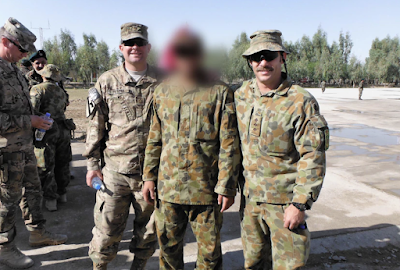 |
| The Taliban are threatening to kill interpreters who helped Australia |
And yet Australia is still dragging its feet. Shame on our government. Lots of talk, but still none arrived in Oz. Though we managed to resettle 280 in 2014. [Update: ABC666 Canberra just said that there's a list of 9 interpreters helping Australia who have already been killed by the Taliban. And former Oz soldier Stuart McCarthy is saying that the window to evacuate them is closing quickly]
The danger is wider than just the interpreters. As William Maley of the ANU, author of The Afghanistan Wars says that all the Afghani who helped implement Australia's aid projects, are also in deadly danger. [ABC666 Radio Canberra, 21 June 2021, 10:20 am HKT]
It's so depressing that after two decades, the allies in Afghanistan are about to leave nothing behind of value. It will all be retaken by the Taliban. Who will re-implement their severe Islamic society. The Afghanis don't want it either, it seems. I've seen farmers interviewed. They hate the thought of the allies leaving. The Taliban love it. The wrong people are hating and loving the departure of allied troops.
Here's a letter from many old-time workers in Asia, to the PM:
Dear Prime Minister and Minister for Immigration,
The undersigned are a group of Australians who have worked in the Indo Pacific in government, business and the media from the sixties until the present day.We would ask you and your ministerial colleagues to arrange residence visas for those Afghan staff who have worked for the Australian Government in Afghanistan.Most of us recall vividly when in 1975, the Whitlam Government failed to evacuate our Cambodian and Vietnamese staff when Phnom Penh and Saigon fell to the Khmer Rouge and the North Vietnamese army respectively. Some of us were in the Indochina theatre at the time. Others spent substantial periods there.This omission was in stark contrast to the actions of the United States, and of other countries which had been involved in the Indochina wars on the side of the United States.It was assessed in 1975 that locally engaged staff would probably be safe in Saigon and Phnom Penh. That assessment was wrong. Only two of some 80 staff and their family members survived the takeover of Cambodia by the Khmer Rouge. After the fall of Saigon, a large proportion of our employees were sent to re-education camps.Put simply, we failed to repay loyalty to Australia.We appreciate that the situation in Afghanistan differs in important respects to that of Indochina in 1975, one of which is that Kabul and some other areas of Afghanistan are not in imminent danger of capture by the Taliban.However the situation in Kabul has been deemed too unsafe for Australia based staff. It follows that Afghans who were in our employ must also be endangered.We would argue that if there is a possibility that our Afghan staff could be killed or mistreated because of their employment with the Australian Government, their security should be taken as seriously as that of those Australians with whom they worked.Moreover history shows that there is often little or no time to process permanent residence applications on a case-by-case basis – as was one argument in 1975 for lack of action regarding our employees.We note the positive approach to permanent residence which is being taken in relation to those Afghans who have worked closely with the Australian Army. Australia’s other employees should be accorded the same consideration.The signatories of this letter do not propose to release it as a public document. [PF: odd that it appears in the "Pearls and Irritations" then]Yours sincerelyDavid ArmstrongMichael BroganAlison Broinowski AMRichard Broinowski AOPenny BurttJocelyn Chey AMProf. Peter Church OAMJohn ConnorMike CourtnallJim CroweRawdon Dalrymple AORoss DalrympleMike DavisBruce DoverHon. Gareth Evans ACSteven Fitzgerald AOCarrillo Gantner AOCavan HogueMalcolm HudsonProf. John InglesonMiles KupaChristopher LambDr. Simon Longstaff AOMichael Mann AOIan MacintoshIan MacpheeJohn McCarthy AOJohn Menadue AOGeoff Miller AOProf Tony Milner AMCarl RobinsonGlen RobinsonMichael RylandTim StorerPeter Varghese AOSue WalkerPatrick WaltersTrevor WatsonGrahame WhiteMack Williams; James Wise